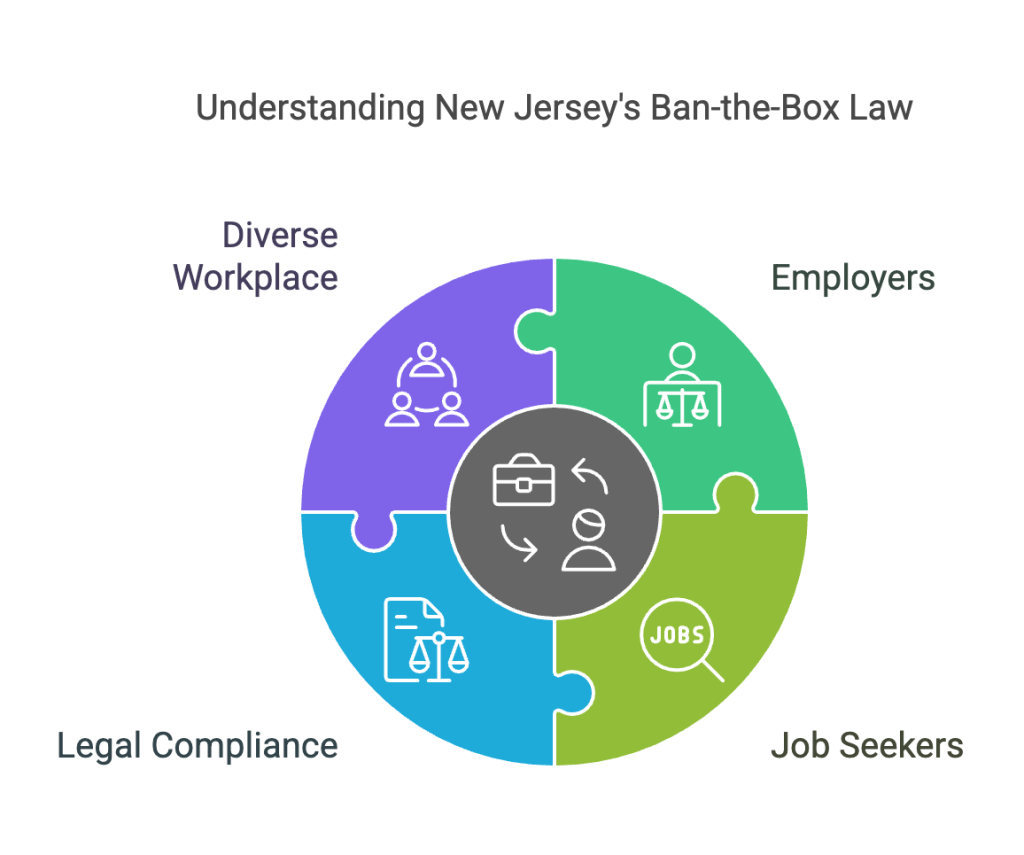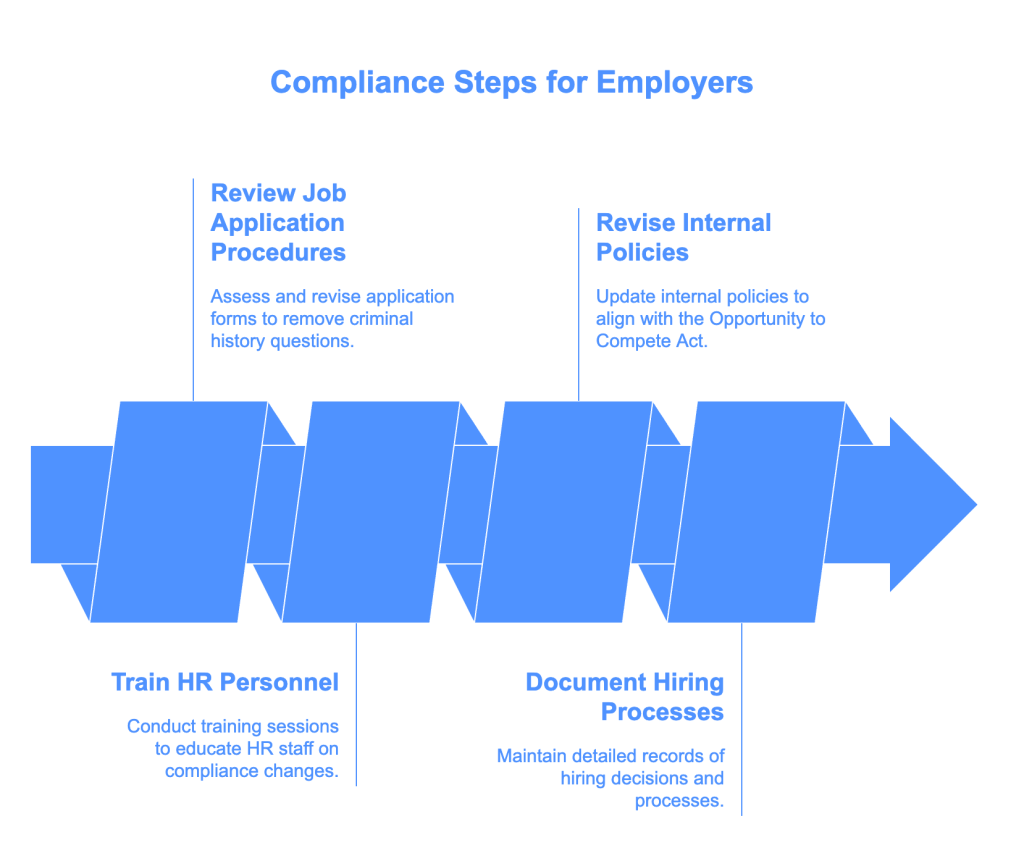When it comes to hiring practices, New Jersey stands out with the Opportunity to Compete Act, part of a growing movement known as "Ban-the-Box". This piece of legislation aims to provide individuals with prior convictions a fair shot at employment. Whether you're an NJ employer navigating the regulations or an applicant understanding your rights, this guide will deliver a comprehensive tour through the specifics of New Jersey's Ban-the-Box compliance.
Key Takeaways
- The Opportunity to Compete Act, also known as "Ban-the-Box," seeks to ensure fair hiring practices in New Jersey by postponing criminal history inquiries until after a conditional job offer.
- Employers must follow specific guidelines, such as removing criminal history questions from initial applications and complying with exceptions for certain roles.
- Compliance steps include adjusting hiring processes, educating HR personnel, and maintaining solid documentation of hiring decisions.
- Non-compliance with the Act can result in significant fines and legal actions, stressing the importance of staying informed and adhering to established procedures.
- Embracing fair hiring practices not only aligns with legal requirements but also enhances workplace diversity and opens more opportunities for qualified candidates.
Introduction
The Opportunity to Compete Act, often referred to as a "Ban-the-Box" law, aims to improve the hiring process for individuals with previous convictions in New Jersey. Its primary goal is to provide these individuals with a fair chance to demonstrate their qualifications before their criminal history becomes a focal point. By restricting when and how employers can inquire about an applicant's criminal past, this legislation seeks to level the playing field during the recruitment process.
For employers, compliance with the Act is crucial. It ensures that hiring practices align with state law while promoting a diverse and inclusive workplace. By implementing fair hiring practices, businesses not only meet legal standards but also attract a broader range of skills and perspectives. On the flip side, job seekers benefit by having their skills and experience weighed first, which can significantly impact their ability to secure employment.

Understanding the significance of such legislation is critical. As an employer, are you prepared to shift your hiring practices to comply with New Jersey's requirements? As an applicant, do you know your rights under this law? These are key questions to consider as we explore the specifics of New Jersey's Ban-the-Box compliance.
What is Ban-the-Box?
Ban-the-Box is an initiative designed to promote fair hiring practices by removing the checkbox on job applications that asks candidates if they've been convicted of a crime. This movement began in the early 2000s, with Minnesota being the first state to adopt such a law in 2009. Its purpose is clear: delay questions about an applicantâs criminal history until later in the hiring process. This delay allows candidates to be judged on their qualifications instead of immediately being discounted due to past convictions.
The main goal of Ban-the-Box is to level the playing field. Employers are encouraged to evaluate applicants based on their skills and experience first, considering criminal records only when they become relevant. This approach can widen the pool of available candidates, potentially enhancing diversity within the workforce. It can also play a role in reducing recidivism by increasing employment opportunities for those with criminal records.
By shifting the timing of criminal history inquiries, Ban-the-Box helps applicants to demonstrate their potential without the immediate stigma of past mistakes. Have you considered how delaying this question might affect the diversity and talent pool in your organization?
Key Provisions of the Opportunity to Compete Act
Let's get into the details of New Jersey's Opportunity to Compete Act. This legislation is designed to give individuals with criminal histories a genuine chance in the job market.
Timing for Criminal History Inquiries
For starters, New Jersey employers cannot make any inquiries about an applicant's criminal history during the initial employment application process. This means no questions on job applications, and no verbal or written queries are allowed before the first interview. This ensures applicants are assessed on their qualifications first and foremost.
Restrictions on Advertisements and Applications
Job postings are under scrutiny too. Employers in NJ cannot state that applicants with criminal records won't be considered. This means no "clean record required" phrases or similar language in any hiring advertisements. It's a move towards more inclusive job listings, encouraging wider applicant pools.
Conditional Job Offers in NJ
Once a conditional job offer is on the table, employers can lawfully inquire about criminal histories. This "conditional offer" is crucialâit means you are extending a job offer that's contingent upon satisfactory results from permitted background checks. Only at this point can past convictions enter the conversation.
Exceptions to the Rule
There are exceptions aimed at certain sensitive roles. For instance, positions in law enforcement, corrections, or where other federal or state regulations indicate necessity, might require checks earlier in the process. These exceptions ensure public safety while balancing fair employment opportunities.
Being aware of these provisions can help you align your hiring practices with the law, promoting fair chance hiring while maintaining compliance. Do these rules seem practical and fair within your hiring practices?
Compliance Steps for Employers
First, take a hard look at your job application procedures. Remove any questions about criminal history in initial applications. This ensures you're in line with the Act. By revising your applications, you eliminate potential liabilities and show good faith in fair hiring practices. Make sure your HR personnel understands these changes. A training session can go a long way. It's about educating them on the timing of when they can discuss criminal history with applicants.
Internal policies might need a tweak. Align them with the Opportunity to Compete Act to avoid any surprises. Include a section about handling conditional job offers and the subsequent steps for performing background checks. This clarity in your policies will help your team stay consistent.
Documentation is your safety net. Keep thorough records of hiring processes and decisions. This may include files on interviews and the reasoning behind hiring or not hiring a candidate. Accurate documentation serves as proof of compliance if questions arise. Always be prepared to back up your decisions with solid evidence.

These steps not only ensure compliance but also promote a culture of fair hiring. Such a framework benefits both your organization and the wider community as it welcomes diverse candidates and gives everyone an equal chance.
Understanding NJ Criminal History Inquiries
Knowing when and how you can inquire about an applicant's criminal history is crucial in New Jersey. The Opportunity to Compete Act sets clear boundaries. You can only delve into this aspect after making a conditional job offer. This ensures you're assessing applicants based on their qualifications first, not their past.
Once you've extended a conditional offer, you may conduct a background check. Use this stage to ensure your role requirements align with relevant criminal history. For instance, a history of financial fraud might be pertinent to a banking role but not as significant in a non-financial position.
Utilize background checks responsibly and remember the importance of fairness. The nature and timing of the conviction, the nature of the job, and proof of rehabilitation should guide your decision-making. Prioritize qualifications and character when evaluating candidates with criminal records. This approach not only promotes fairness but also can widen your talent pool and enhance diversity within your organization.
Reflect on your current practices. Are you positioning your inquiries to respect applicant privacy and dignity while balancing your company's needs?
Fair Chance Hiring in NJ: Best Practices
Creating a fair hiring process is integral to the success of Ban-the-Box initiatives. Start with removing language that asks about criminal records from your initial job applications. This ensures you're evaluating candidates based on skills and qualifications first.
Implement structured interviews with consistent questions for every candidate. This reduces bias and levels the playing field. Encourage blind hiring practices where feasible, which can include screening resumes without names or other identifiers that hint at personal history.
Consider connecting with community organizations that specialize in helping individuals with prior convictions. Partnering with them can provide support and resources for both you and potential employees. This engagement not only broadens your candidate pool but also strengthens your company's social responsibility ties.
To maintain fairness and compliance, set up monitoring systems. Regularly review hiring metrics to assess whether your process is inclusive. Document these reviews to show your commitment to fair hiring.
Directly involve your HR team in these best practices. Train them to ensure everyone is on the same page about the importance of equal opportunity for all applicants. This training sets the tone for a more inclusive workplace atmosphere.
By implementing these practices, you align with legal requirements and contribute to a more diverse and fair workplace. Are you ready to make a positive impact in your hiring approach?
Legal Considerations and NJ Employer Penalties
Non-compliance with the Opportunity to Compete Act can lead to serious consequences for employers in New Jersey. Penalties range from fines to potential legal action, especially for repeat offenders. The law is clearâviolating it offers no benefits, only liabilities.
Employers could face fines starting at $1,000 for a first-time violation, increasing to $5,000 for subsequent offenses. This financial burden is just the tip of the iceberg, as legal battles can also damage a company's reputation and employee morale.
Employees have rights and can seek legal recourse if they believe there has been a breach. This can include reporting the violation to state authorities or taking legal action. Employers should take these potential outcomes seriously.
Staying informed is not just good practice; itâs necessary. Regularly check for updates in state legislation and seek legal counsel to ensure compliance. Ignorance of the law is not an excuse, so make it a habit to stay knowledgeable. Keeping legal advice handy is essential to avoid pitfalls.
By understanding these legal considerations, you reduce the risk of penalties and ensure a smoother hiring process. What measures are you taking to stay compliant with the Opportunity to Compete Act? Start by reviewing your policies and keeping informed.
Conclusion
Understanding and complying with the Opportunity to Compete Act is crucial for fostering a fair labor market. For employers, implementing fair hiring practices not only aligns with legal obligations but also promotes a diverse workplace. For applicants, being informed about their rights can empower them to pursue job opportunities confidently.
Employers can further enhance their compliance efforts by exploring additional resources. For instance, the Federal Trade Commission (FTC) provides guidance on conducting background checks lawfully, which is a valuable tool for staying within legal boundaries. Employers are encouraged to stay informed and seek legal counsel when necessary to adapt to any changes in legislation.
This guide offers the foundational knowledge needed to navigate Ban-the-Box legislation effectively. Employers and job seekers alike have the opportunity to contribute to a more inclusive employment environment.
Frequently Asked Questions (FAQs)
When can NJ employers ask about criminal history?
Employers in New Jersey cannot inquire about your criminal history until after the first interview.
What jobs are exempt from NJ Ban-the-Box?
Certain positions, like law enforcement, corrections, and positions that require bonding or security clearance, are exempt.
How to handle background checks after a conditional offer?
Employers can perform a background check after extending a conditional offer of employment. They should ensure this process is job-related and consistent with business necessity.
Are gig workers covered under NJ Ban-the-Box?
Gig workers are generally not covered under NJ Ban-the-Box as the law applies to employees and not independent contractors.
Can employers rescind offers based on criminal records?
Yes, but the decision must be job-related, consistent with business necessity, and take into account factors like the nature of the offense and the time since the conviction.
Whatâs the penalty for violating NJâs law?
Employers face fines ranging from $1,000 to $10,000 depending on the number of violations.
Do NJ schools follow Ban-the-Box?
Yes, public schools must comply with Ban-the-Box, though they can consider criminal history after the initial interview.
How to update job applications for compliance?
Remove questions about criminal history from initial job applications. Instead, limit inquiries to post-interview stages.
Are misdemeanors included in NJ background checks?
Yes, misdemeanors can be included in background checks conducted after a conditional offer has been made.
Does NJ Ban-the-Box apply to out-of-state employers?
It applies if you are working within New Jersey, regardless of the company's headquarters.
Can criminal history be considered for promotions in NJ?
Yes, but similar rules apply as for initial hiring. Consideration should be job-related and consistent with business necessity.
Are volunteer positions subject to Ban-the-Box laws?
Volunteer positions are generally not covered unless they require a formal employment relationship.
Does NJ Ban-the-Box apply to small businesses?
Yes, it applies to businesses with 15 or more employees over 20 calendar weeks in the current or preceding year.
Can you dispute a background check result?
If incorrect, you can dispute background check results with the background check company or employer.
Definitions
Conditional Job Offer
A conditional job offer is a preliminary agreement to hire a candidate, provided certain criteria are met. In the context of Ban-the-Box laws, employers in New Jersey may only inquire about a candidateâs criminal history after making this type of offer. It allows time to evaluate the applicantâs qualifications before considering background checks. Are your job offers clearly labeled as conditional in your hiring process
Criminal History Inquiry
This refers to any question or research into an individualâs criminal record. Under the Opportunity to Compete Act, New Jersey employers are barred from making these inquiries until after a conditional job offer. Asking too early can result in penalties. Have you reviewed when your hiring team discusses background checks?
Fair Chance Hiring
Fair chance hiring prioritizes evaluating candidates based on their skills and experience rather than past criminal records. The goal is to create equal employment access, especially for individuals with convictions. Structured interviews and blind resume reviews are two ways to implement it. How inclusive are your current hiring practices?
Background Check
A background check is the process of reviewing a candidate's history, often including criminal records, education, and employment verification. In New Jersey, it should only occur after a conditional offer is extended. Align your procedures with this timing to avoid legal issues. Are your background check protocols in sync with state law?
Job Advertisement
A job advertisement outlines the qualifications and responsibilities for an open role. Under Ban-the-Box laws, NJ employers cannot include language that excludes applicants with criminal records. Statements like âclean record requiredâ violate the law. Have you audited your job postings to confirm compliance?
References
- https://www.nj.gov/corrections/pdf/OPSS/FRARA/Employment%20and%20Training/Opportunity%20to%20Compete%20Act.PDF
- https://www.greenbaumlaw.com/insights-publications-Legislation_Bars_Employers_from_Conducting_Criminal_Background_Checks.html

GCheck Editorial Team
Meet the GCheck Editorial Team, your trusted source for insightful and up-to-date information in the world of employment background checks. Committed to delivering the latest trends, best practices, and industry insights, our team is dedicated to keeping you informed.
With a passion for ensuring accuracy, compliance, and efficiency in background screening, we are your go-to experts in the field. Stay tuned for our comprehensive articles, guides, and analysis, designed to empower businesses and individuals with the knowledge they need to make informed decisions.
At GCheck, we're here to guide you through the complexities of background checks, every step of the way.






